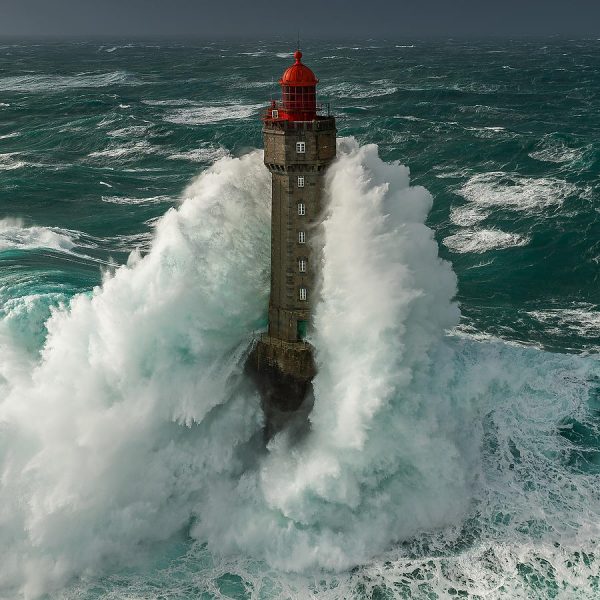
La Jument lies about 300m off the coast of the isle of Ushant, which is also known as Ouessant in French and Enez Eusa in the Breton language.
Poster prints of Breton lighthouse La Jument can be seen decorating the walls of over a million homes, offices and pubs around the world, but Bretagne’s treacherous reef has been known for centuries by sailors in the Celtic Sea.
La Jument lies about 300m off the coast of the isle of Ushant, which is also known as Ouessant in French and Enez Eusa in the Breton language. A dangerous reef lurking below the waves in one of Europe’s busiest seaways, the area has experienced many shipwrecks over the centuries; between 1888 and 1904 thirty-one ships were wrecked there.
Plans to build a lighthouse on La Jument started not long after the wreck of the Glasgow-built steam ship Drummond Castle in 1896, when about 250 people drowned. The building works were privately financed by a wealthy Frenchman who had almost died in another shipwreck. Construction began in 1904 but the lighthouse could not be finished until 1911 because of the sea’s often challenging weather conditions.
Over the past century La Jument lighthouse has effectively increased maritime safety in the area, known to the Bretons as Mer d’Iroise of Iroise Sea. However, the waters off Bretagne’s west coast still remain one of the most dangerous seas in Europe with frequent violent storms, huge waves and strong currents.
 One of those infamous storms on the Iroise Sea happened on 21 December 1989. A front of low pressure coming from Ireland brought gale force winds and huge waves of 20 to 30 metres high which crashed spectacularly against the lighthouse.
One of those infamous storms on the Iroise Sea happened on 21 December 1989. A front of low pressure coming from Ireland brought gale force winds and huge waves of 20 to 30 metres high which crashed spectacularly against the lighthouse.
The waves smashed through the lower windows of the lighthouse, ripped the front door, flooded the tower and washed away the furniture. Lighthouse keeper Théodore Malgorn decided to take refuge up in the lantern room while waiting to be rescued.
About the same time, photographer Jean Guichard was in Lorient hiring a helicopter to take aerial pictures of the storm. Guichard wanted to fly over the Iroise Sea despite extremely dangerous flying conditions.
The helicopter made it to La Jument and hovered around for Guichard to take shots of the waves pounding the lighthouse. Inside the tower, Théodore Malgorn heard what he thought was his rescue helicopter and hurried downstairs to open the door.
At that very moment, a giant wave rose over the rear of the lighthouse and Guichard took his world-famous shot as the wave smashed against the tower. Théodore Malgorn, suddenly realizing that a giant wave was about to engulf the structure, rushed back inside just in time to safe his life.
Jean Guichard’s 1989 dramatic storm photo shots became an instant hit and earned him the World Press Photo award. La Jument appeared on newspapers and magazines all around the world and Guichard went on to publish a bestselling book about lighthouses and a collection of poster prints.
La Jument’s poster print has sold well over one million copies, making the Breton lighthouse the most famous lighthouse print in the world.
Lighthouses in Bretagne have been automated in the past decades and La Jument itself has no longer a keeper since 1991. For many years Jean Guichard’s quest was to portray Bretagne’s maritime heritage before automatization took over. Many of his photos are now considered to hold a historic value and his work is highly respected in Bretagne.




















I want to work there please.
Hello, my name is Petros Foudotos I m working in Greek navy. I have been training in seals (OYK) for six months n I am excellent swimmer n runner. And good diver. I would like to be applied to this job. And I know about computers
north sea light house house keeper salary per hours